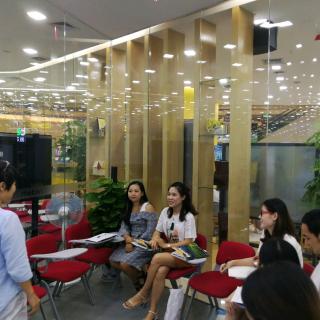
介绍:
【EM4-LP3B Let’s go Shopping 】 Meten, Longhua Center, SZ, LT: Yoga Yu
亲爱的听众朋友们大家好,这里是Yoga的荔枝电台,我是美联深圳龙华中心的LT Yoga,在这里为大家播讲新M4的LP3 Shopping- B Let’s go Shopping的课程,欢迎您的收听,希望通过我们的节目,你能够对本课有更好的预习和复习,让我们开始学习吧!
Unit Goals of Unit3B: 教学目标:
(1)Describe your shopping habits.描述你的购物习惯。
(2)Discuss different places to shop and what they sell. 讨论去不同地点购物和他们售卖的物品。
【Words and phrases: 单词和短语:】
一、课文中的单词和短语:luxury adj/n, 奢华的,奢华;Berlin 柏林, Germany德国,
electronics store电子产品商店, jewelry store珠宝店, thrift store二手店,旧货店,
used clothes 二手衫, furniture家具, chocolate巧克力, ring戒指, necklace项链, Seoul首尔, art艺术品, comics漫画书, clothing服装, souvenir纪念品, food stall小吃摊, 大排档,common共同的,普通的, soda苏打, video games电子游戏;
二、关于购物的词汇: go shopping购物, shop for something购买物品,affordable可以
负担的,expensive昂贵的,buy买,sell卖,credit card信用卡, debit card借记卡, cash现金, on sale打折, full price全价; alone独自一人, online线上, at stores in a mall在商场的店里面, in my neighborhood在附近, lower更低的, electronics电子产品,
三、其他词汇: instructor指导书,教员,指导者, complete 完成, opposite相反的,
match the items给这些物品连线, listen for gist听重点, make predictions作出预测, identify main ideas确认主要的观点, extra额外的, quantifier量词, affirmative肯定的, negative否定的, statement陈述, count noun可数名词, noncount noun不可数名词;
(1)询问购物习惯等。1)—How do you usually shop?你通常如何购物呀? —I usually shop with a friend.我通常和一个朋友去购物。
2)—Where do you buy clothes? 你通常在哪里买衣服呀?—I buy most of my clothes at stores in a mall. 我大多数都在商场的店里面买的。
3)—Why do you buy things on sale? 你为什么打折的时候去买东西?—Because the price is lower, so the items are more affordable.因为价格会低些,所以物品会更能接受。
4)—What items do you often spend money on? 你通常把~花在哪些物品上?—I spend a lot of money on electronics each year.我每年都花很多~在电子物品上。
(2) 询问朋友和钱财的句子:
1)—Do you have any friends? 你有一些好朋友吗?—Yes, I have a lot of /many/some friends.是的,我有很多/一些朋友。
—Do you have any friends? 你有一些好朋友吗? —No, I don’t have a lot of/many/ any friends. 不,我没有很多/一些朋友。
3) —Do you have any money? 你有一些钱吗?—Yes, I have a lot of/ some money. 是的,我有很多/一些钱。
4) —Do you have any money? 你有一些钱吗?—No, I don’t have a lot of/much/ any money. 不,我没有很多/一些钱。
(3)询问物品和习惯的句子:1)—Do you buy any clothing online?你在网上买衣服吗?—No, I like to try things on.不,我喜欢试穿。
2)—Do you have any expensive shoes? 你有一些很昂贵的鞋子吗?—No, I don’t have any expensive shoes. 不,我没有一些昂贵的鞋子。
3)—Do you wear jewelry?.你戴珠宝吗?—Yes, I wear some jewelry. 是的,我戴一些珠宝。
4)—Do you read magazines? 你读杂志吗?—Yes,I read many magazines. 是的,我读很多杂志。
【Reading: 阅读】
关于购物的阅读文章。On Sales in Seoul
Are you planning to visit Seoul? South Korea’s capital city has thousands of stores, so give yourself a day or more to go shopping. Here are some things you can buy: 你计划去参观首尔吗?这个韩国的首都有着成千上万的小店,所以给你自己一天或者更多的时间去购物吧,你可以在这里买到以下物品哦:
1). Clothing;Need something to wear? Seoul has a lot of interesting places to shop for clothes. Department stores in the Gangnam neighborhood sell the latest fashions, but they are expensive. For something more affordable, visit Dongdaemun Market. This large shopping area has over 20 malls and more than 25,000 smaller stores. Remember to bring cash and a shopping bag to hold all your items!
1)服装:需要买些衣服穿吗? 首尔有很多有趣的买衣服的地方,江南区的商场售卖最新款的服饰,但是他们太贵了,想要买一些可以负担得起的,就去东大门市场吧,这个大型的购物区拥有20多家购物中心和超过25,000家小店。记得带上现金和购物袋才能装下你采购的所有物品哦!
2). Electronics;Yongsan Market is the place to go for a new computer, phone, or camera. It has 5,000 stores and many items are on sale.
2)电子产品,龙山市场是购买新电脑,手机或者照相机的地方,它有5000家店铺还有很多打折物品。
3). Food and more; Like Dongdaemun, Namdaemun Market is very large and has a lot of shops. These shops sell clothing, items for the home, and many other things—all at affordable prices. Namdaemun is also famous for its food, and there are many places to eat. Most sell traditional Korean dishes, including kalguksu –a delicious noodle soup.
3)食物和其他;比如东大门,崇礼门市场就很大,而且有很多的店铺,这些店铺卖衣服,家居用品还有很多其它的东西,都价格适宜,崇礼门市场的事物也很有名,这里有很多可以吃东西的地方,很多都售卖韩国传统的菜肴,比如说刀切面,就是一种很美味的清汤面条。
4). Art;Looking for a souvenir to take home? Visit Insadong, a beautiful, old neighborhood. Many shops sell traditional Korean drawings and other kinds of art. Some items are expensive, but many are affordable.
4)艺术品;想需找些纪念品带回家吗?参观下仁寺洞吧,一个很漂亮,很古老的街区,很多商店都售卖传统的韩国绘画品和其他种类的艺术品。一些东西很昂贵但是有很多还是价格很适宜的。
4【Writing : 写作】
My favorite place to shop is Uniqlo. It is a popular clothing store.
我最新喜欢去购物的地方就是优衣库了,它是个很受欢迎的服装店。
I like this store for two reasons. 我喜欢这家店有两个理由。
First, a lot of their clothes are affordable. In a department store,I can only buy one pair of jeans. At Uniqlo, I can buy two or three. And the store always has things on sale!
第一是因为它们的衣服是我可以负担得起的,在百货商店,我只能买一条牛仔裤,但是在优衣库,我可以买两到三条,并且店里经常有打折的物品。
I’m a student and I don’t have much money, so this is important.
我是个学生,我没有很多钱,所以这个很重要。
Second, Uniqlo’s clothes are casual but nice. Many things are good for school and work.
第二,优衣库的衣服很休闲但是很好,很多都适合学校和工作穿。
For these reasons, Uniqlo is my favorite place to shop.
基于这些原因,优衣库是我最喜欢去购物的地方。
5.【Grammar】: 可数和不可数名词的修饰语。
一、只能修饰可数名词的词语有:
many, many a(n), a good / great many, a (great / large) number of, scores of, dozens of等。例如:
Scores of people went there in the first few days after its opening.
开张后的头几天,很多人去了那儿。
I have been there dozens of times.
我已去过那儿很多次了。
There’re a number of students reading English in the classroom.
教室里有许多学生在读英语。
Many a student has(=many students have)visited the Great Wall.(谓语动词用单数)
很多学生都游览过长城。
In winter, a good many animals sleep under the snow.
冬天很多动物在雪下冬眠。
注意: many所修饰的复数名词前若有限定词,many 后面要接of, 表示“……中的很多”。 如:
A great many(of the) graduates have found jobs.
毕业生中很多人已经找到了工作。
二、只能修饰不可数名词的词语有:
much, a great deal of, a great / large amount of等。例如:
Is there much water in the bucket?
桶里有很多水吗?
He always has a great amount of work to do.
他总是有很多工作要做。
三、既能修饰可数名词又能修饰不可数名词的词语有:
a lot of, lots of, plenty of (以上三个词语后谓语动词的数依of 后的名词的单复数而定),a great / large quantity of (其后谓语用单数),quantities of (其后谓语用复数)。例如:
There is still lots of snow in the garden.
花园里还有许多雪。
There is plenty of rain here.
这儿的雨水很多。
A great quantity of flowers was placed in the hall.
大厅里放了很多鲜花。
There are large quantities of food in the cupboard.
橱柜里有许多食物。
在所有这些表示“很多”的词语中many, much 是最常用的词,它们既可以用于肯定句,也可以用于疑问句和否定句。例如:
Are there many people in the street?
街上有很多人吗?
There isn’t much time left.
剩下的时间不多了。
其它的词语都用于肯定句,日常会话中常用lots of, a lot of 或plenty of; 正式文体中常用 a great many, a (large) number of, a great deal of, scores of 或 dozens of 等。但若肯定句中有too, so, as, very或how 等词修饰时,则必须使用 many, much。例如:
The number of the people who lost their homes reached as many as 250,000.
无家可归的人数多达250,000人。
There is too much work to do.
要做的工作太多了。
大家还在听

